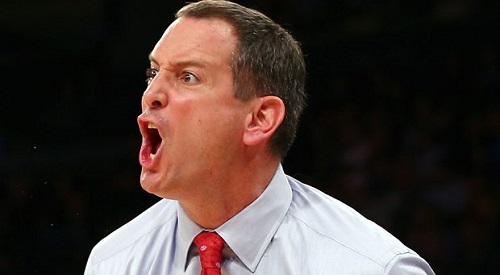
Lessons Learned from the Mike Rice Rutgers Firing
Football coaches everywhere should be keeping a close eye on the story of Mike Rice. The former Rutgers men’s basketball coach was fired this week after video evidence of him physically and verbally abusing players surfaced, and the scandal has since engulfed athletic director Tim Pernetti (who resigned) and school president Robert Barchi (who’s still there, for the moment). It’s a story that could go well beyond basketball, though, and there are plenty of implications for football, a sport where many coaches have long been known for being hard on their players. This is true at both the college and professional levels, too; college coaches have perhaps even greater responsibility given their players’ younger age, but there should be strict limits on what professional coaches can and can’t do as well. Here are five lessons every football coach should consider as a result of the Rutgers scandal.
[php snippet=1]
1. Physical abuse is out: Rice’s saga has sparked plenty of debates over just what’s appropriate in coaching, but one thing most have agreed on is that the videos of his physical interactions with players are extremely concerning. On the footage, he throws basketballs at players’ heads, as well as grabbing, shoving and kicking them. Once upon a time, this might not have sparked as much comment, as many coaches were well-known for being physically tough towards players. In today’s environment, though, this simply doesn’t work, especially when you consider the myriad physical concerns already floating around football. There’s no reason for a coach to ever need to physically shove a player, throw a ball at them or anything of the sort, and these sorts of actions are the least debatable. Words can be argued about; physical violence is much harder to dispute.
2. Players’ physical safety should be top of mind: This is related to the above point, but it’s worth noting that not all physical hazards for players come from a coach directly striking them. Instructing players to run a needlessly-violent drill, preventing them from taking water breaks, ignoring injuries in practice or running players until they puke can be just as dangerous. These issues are long-standing football ones, and they’ve been mentioned with famed coaches from Bear Bryant to Vince Lombardi. Toughness has long been considered a crucial part of football, but in today’s environment, player safety has to be an even more important consideration. That doesn’t mean coaches can’t be tough; it does mean that they should be careful not to physically abuse players, even indirectly.
3. Verbal comments should never be about race, gender or orientation: One of the things Rice has been criticized for was blasting his players with homophobic and profane insults, including “f*ggots” and “c*nts”. Verbally berating players in any way is questionable, but implying a player is gay, a woman or less valuable thanks to his race should be completely off limits. That’s not to say coaches have to be all sweetness and light, but there are some areas that they just shouldn’t touch.
4. Coaches should be authority figures, but should use that authority wisely: The basic idea of a coach being above his players isn’t a bad one. Coaches need to be players’ bosses before being their friends: plenty of coaches have pointed that out over time, from Ray Perkins, Bill Parcells and Bill Belichick (discussed in David Halberstam’s The Education of a Coach) to Chuck Noll (discussed in Roy Blount’s Three Bricks Shy Of A Load). As Floyd Reese told Belichick in Halberstam’s book, “Do not try to be the players’ pal. It won’t work. They’ll screw you every time. … You’re not here to be their pal. You’re here to coach them, and that often means telling them things they don’t want to hear about doing things they don’t want to do.”
This is why the basic idea of coach-imposed discipline isn’t a bad one. Another key point in that book is that Belichick was able to prove his value to players by finding things in film that other teams would do and tipping them off, though. Coaches should be out to maximize their players’ skills and push them to be better, and they should have the power to do so, but they should use that power carefully and do so in a way that’s best for the players over the long run. With Rice, much of his approach seemed just to reinforce the idea that “power is power”, and while that may work in Game of Thrones, it’s not the best way to coach a team over the long run.
5. There should be checks and balances on coaches: Coaches need to have authority, and in most cases, their authority shouldn’t be diminished by others. A team where players complain to the the general manager or the owner (or in the case of college football, the athletic director or the school president) about a lack of playing time and expect something to be done about it probably isn’t a healthy team. However, there should always be safe avenues for players to report Rice-style behavior that goes beyond what a coach should be doing. Whether that’s through team counsellors or chaplains or whether it’s going directly to the man above the coach, players should be able to speak out internally when something’s really wrong, and those in power should take those concerns seriously. As with most of these lessons, that’s not meant to undermine coaching authority; coaches should be the ones making the decisions about who plays, how to get their players to improve and so on. Both coaches and players should be aware that not absolutely anything goes, though, and that’s the real lesson of the Mike Rice saga.
[php snippet=1]

